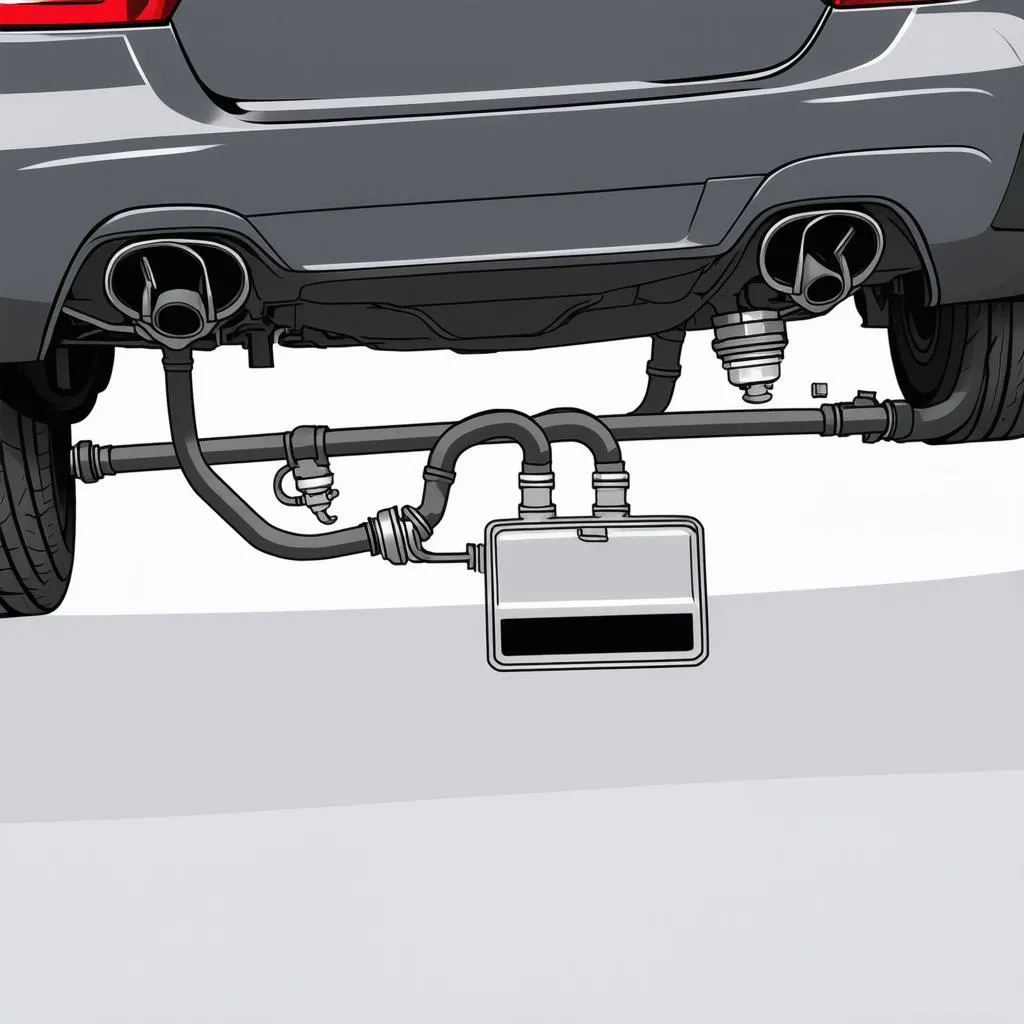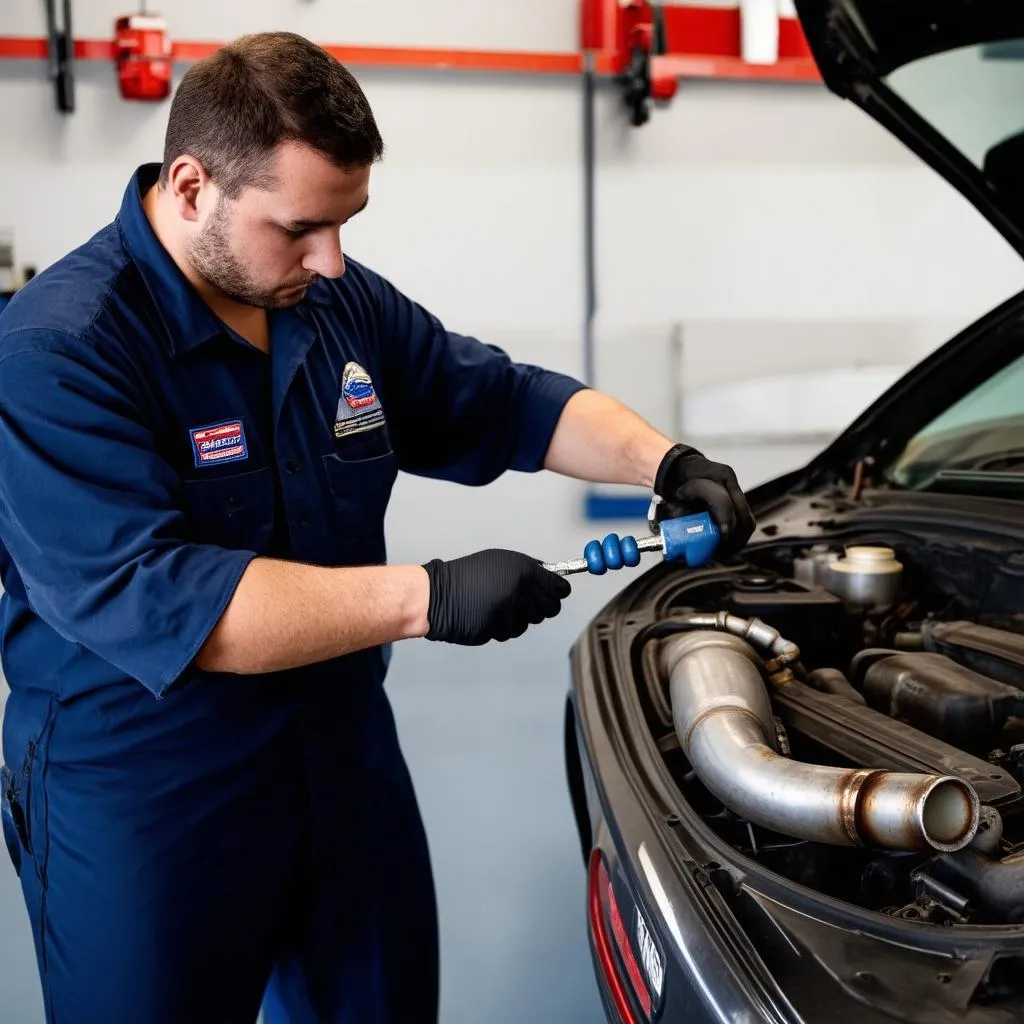Picture this: you’re cruising down the Pacific Coast Highway, the California sun warming your face, your favorite tunes filling the air, and suddenly, that dreaded check engine light pops up on your 2002 Nissan Altima’s dashboard. You pull over, heart sinking, and reach for your trusty OBD-II scanner. The culprit? The infamous P0420 code. Don’t panic! This scenario is more common than you might think, and understanding what this code means can save you time, money, and unnecessary stress.
What Does P0420 Really Mean for Your Nissan Altima?
In simple terms, the P0420 code indicates a potential problem with your car’s catalytic converter system. Specifically, it suggests that the catalytic converter, responsible for reducing harmful emissions, isn’t operating at its optimal efficiency.
Imagine your catalytic converter as the gatekeeper of clean air, diligently filtering out harmful pollutants from your car’s exhaust. The P0420 code is like a warning signal from this gatekeeper, hinting at a potential clog or malfunction that’s hindering its performance.
Decoding the P0420: Common Causes and Solutions
Before you jump to conclusions about a faulty catalytic converter, remember that several factors can trigger this code in your 2002 Nissan Altima. Let’s break down the most common culprits:
1. Oxygen Sensor Malfunction
The Eyes and Ears of Your Exhaust System
Your car relies on oxygen sensors to monitor the exhaust gases and ensure the catalytic converter is working correctly. A faulty oxygen sensor can send inaccurate readings to the engine control unit (ECU), triggering the P0420 code even if your catalytic converter is perfectly fine.
The Solution: Have a qualified mechanic inspect and replace any malfunctioning oxygen sensors.
2. Exhaust Leaks
The Sneaky Culprit
Exhaust leaks can wreak havoc on your car’s emissions system. A leak before the catalytic converter can disrupt the exhaust flow and oxygen readings, leading to a false P0420 code.
The Solution: A thorough inspection by a mechanic can pinpoint and repair any exhaust leaks.
3. Faulty Catalytic Converter
The Heart of the Matter
While not always the case, a damaged or worn-out catalytic converter can be the root of the problem. Over time, extreme heat, internal damage, or contamination can impact its efficiency.
The Solution: Replacing a faulty catalytic converter is a significant repair. Consult a trusted mechanic to diagnose the issue and discuss replacement options.
4. Engine Performance Issues
A Ripple Effect
Problems like misfires, rich fuel mixtures, or oil burning can negatively impact the catalytic converter’s performance, triggering the P0420 code.
The Solution: Addressing underlying engine issues is crucial to prevent further damage to the catalytic converter.
 Car exhaust system
Car exhaust system
Beyond the Code: Understanding the Impact
Ignoring the P0420 code can lead to various consequences, affecting your car’s performance and the environment:
- Decreased Fuel Efficiency: A malfunctioning catalytic converter disrupts the optimal air-fuel ratio, leading to increased fuel consumption.
- Failed Emissions Tests: Your car may fail emissions tests if the catalytic converter isn’t functioning correctly.
- Engine Damage: Prolonged exposure to unfiltered exhaust gases can damage other engine components.
- Environmental Impact: A faulty catalytic converter releases harmful pollutants into the atmosphere.
Addressing the P0420 Code: A Holistic Approach
While a trip to the mechanic is often necessary, adopting a holistic car maintenance approach can prevent many P0420 code triggers:
- Regular Oil Changes: Using the correct oil type and adhering to recommended oil change intervals prevents engine wear and tear that can damage the catalytic converter.
- Quality Fuel: Using high-quality fuel with the recommended octane rating ensures optimal combustion and minimizes harmful deposits in the catalytic converter.
- Avoid Engine Overheating: Overheating can severely damage the catalytic converter. Ensure your cooling system is functioning correctly.
 Mechanic inspecting car
Mechanic inspecting car
Frequently Asked Questions about the P0420 Code:
Can I still drive my car with a P0420 code?
While you might be able to drive short distances, it’s best to address the issue promptly to prevent further damage and potential safety hazards.
How much does it cost to fix a P0420 code?
The cost can vary significantly depending on the root cause and the necessary repairs. Oxygen sensor replacement is less expensive than a catalytic converter replacement.
Can a faulty gas cap trigger a P0420 code?
While rare, a loose or damaged gas cap can affect the evaporative emissions system, potentially triggering a P0420 code.
Need Help with Your Nissan’s P0420 Code?
Dealing with car trouble can be stressful. If you’re facing a P0420 code on your 2002 Nissan Altima, our team of automotive experts at techcarusa.com is here to help. We offer a wide range of diagnostic tools and software, along with expert advice to guide you through the repair process.
Contact us today via WhatsApp at +84767531508 for 24/7 support!
We’re here to help you get back on the road and enjoy those scenic drives worry-free!